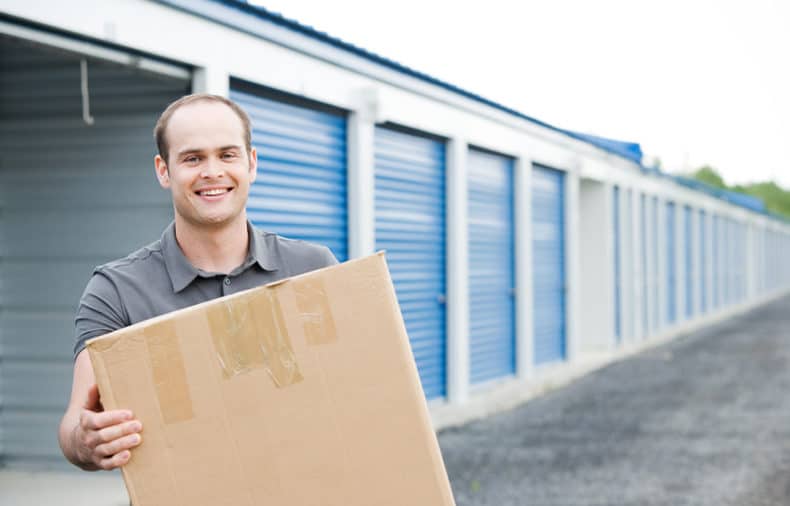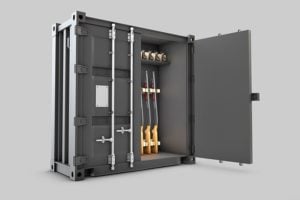Self-storage rental fees
Your rental fee will vary depending on duration, size, and special requirements. Self-storage facilities can be rented weekly, monthly, or annually. When signing a rental contract, you may be asked to leave a deposit. A deposit should be refunded when you remove your items from storage, but make sure you understand the exact requirements for receiving a refund in full.
Note the procedure for terminating your rental contract. Most self-storage facilities require advance notice if you want to end your contract. Some companies will reimburse you for unused rental time, and some may keep your pre-paid rent. Also understand how and when your rental facility can terminate your contract. Non-payment or late payment is one of the many reasons a rental company can evict you, and it is important to know how your possessions will be handled in the unlikely event you are evicted.
Special services
Many storage facilities provide services other than simple unit rental. Companies may offer equipment rental, truck use, and hired labor that may add to the cost of your rental services. If your self-storage company offers these add-ons, clarify the restrictions and fees. Sometimes, these bundled services are more expensive than if purchased separately. Make sure your storage company is giving you the best deal.
Self-storage contracts
Avoid surprises by reading your storage contract carefully. A self-storage contract outlines all fees and rules regarding your rental unit. Your contract should itemize the cost of the unit, hired labor, truck and equipment rental, insurance, and a lock. In addition, it should explain billing, security, and insurance policies.
All storage rental contracts should include:
- Your rental fee
- The cost of extra services or equipment
- Billing schedule and payment options
- Insurance requirements
- Access instructions
- Termination information
- Eviction policies
Accessing Your Self-Storage Unit
Access hours: When choosing a storage company, consider the access provided to tenants. Find out the facility’s hours of operation and gate hours. As opposed to office hours, gate hours give renters extended access opportunities. Some self-storage facilities let you set an after-hours appointment with a facility employee, but there may be a fee for this service.
Storage unit location: The location of your unit within the storage facility also affects access. If your storage unit is on the second floor, make sure the facility has elevators large enough for your belongings. If you have many oversized items to store, consider renting a drive-up unit.
Visitors to your storage facility: If someone other than you needs access to your storage unit, ask your rental company about their visitor policy. Some companies must give permission for visitors, while others let anyone with your key or access pass to enter. If a guest is accessing your unit, notify your storage facility at least a day ahead. Warn your visitor of any sign-in procedures and make sure to give them the proper documentation. Ask your storage facility these questions about access:
- Can you only access your unit during open hours?
- Do you need to make an appointment to pick up or drop off items?
- Is there a fee for special access?
- Are there parking fees?
- Is there limited access for indoor units as opposed to outdoor units?
- What are the visitor policies?
Self-Storage Insurance
Even though your items may be covered in your home, you must purchase additional insurance to cover them in storage. There are several insurance options for your stored belongings; know what is available to choose the right coverage at the right price.
Your self-storage company may request proof of insurance before renting space. Insurance is not something to be overlooked and can give you peace-of-mind when storing your personal belongings. Emergencies that insurance can cover include:
- Fire
- Flood
- Rodent/insect infestation
- Theft
Storage facilities do not insure your possessions or take responsibility for their safety. Some rental companies may offer insurance for an additional fee, and sometimes purchasing this insurance is required. Most basic insurance provided by a rental company only covers a fraction of your belonging’s value.
Purchasing storage insurance: Instead of relying on the minimum insurance provided by your storage facility, request coverage from your home insurance policy. Some homeowner’s insurance policies cover items in storage, and many offer the option of purchasing additional insurance.
Before storing items, make an inventory of everything you need covered under your storage insurance policy. Because you may be picking up or dropping off items at your storage unit, ask your insurance company how to submit changes to your inventory.
Self-Storage Security
Storage locks: A quality lock provides the most basic protection for your storage unit. Most storage facilities give you the option to purchase a lock from them or buy one on your own. Purchasing a lock yourself will ensure that you are the sole key-holder. Ask your storage manager for lock recommendations. Some storage companies require that you purchase a lock when signing your contract. These locks may be more expensive, but they are superior to most common locks and offer special security features.
Security, surveillance, and guards: Your lock protects your individual unit, but you also want to consider the security of the storage facility. You may choose an outdoor unit if you want more flexible access for loading and unloading, but this does not mean you sacrifice security. All rental facilities should have adequate perimeter protection. Most outdoor self-storage facilities have fencing, while brick walls may protect both outdoor and indoor rental units.
No tenant should be able to access the storage units without a key or access cards. Open storage facilities invite theft, so make sure that the outside of your rental location is secure. As a courtesy to your fellow tenants, close all gates behind you and watch out for suspicious people around the property. If you need additional protection, rent from a facility that has 24-hour video surveillance. Some storage companies also offer on-site security guards after hours. If you are storing particularly valuable items this may be worth the extra cost.
Employee access: Check that your rental company has a strict policy on employee access to your storage unit. Self-storage employees should only be able to access your items in case of an emergency, or if you default on your payments. No company should have unlimited access to your belongings or the ability to move your goods at their discretion.




